by Peter Ramjug
News@Northeastern
Catherine Di Gangi and her roommate, Jenna Evans, feel lucky that they don’t have to worry where their next meal is coming from, but they know plenty of others for whom hunger is a constant concern.
Their compassion is what has them standing on a small patch of grass near Centennial Common by the Ruggles train station on a cold December day, unpacking boxes of anything and everything donated by a food pantry near the Boston campus. Laid at their feet are sticks of salted Irish butter, a pack of frozen green peas, boxes of fresh cucumbers, loaves of white bread, and tubes of cookie dough.
None of the various odds and ends are in danger of melting or going bad, because it is so cold outside that they could set out ice cream without a worry.
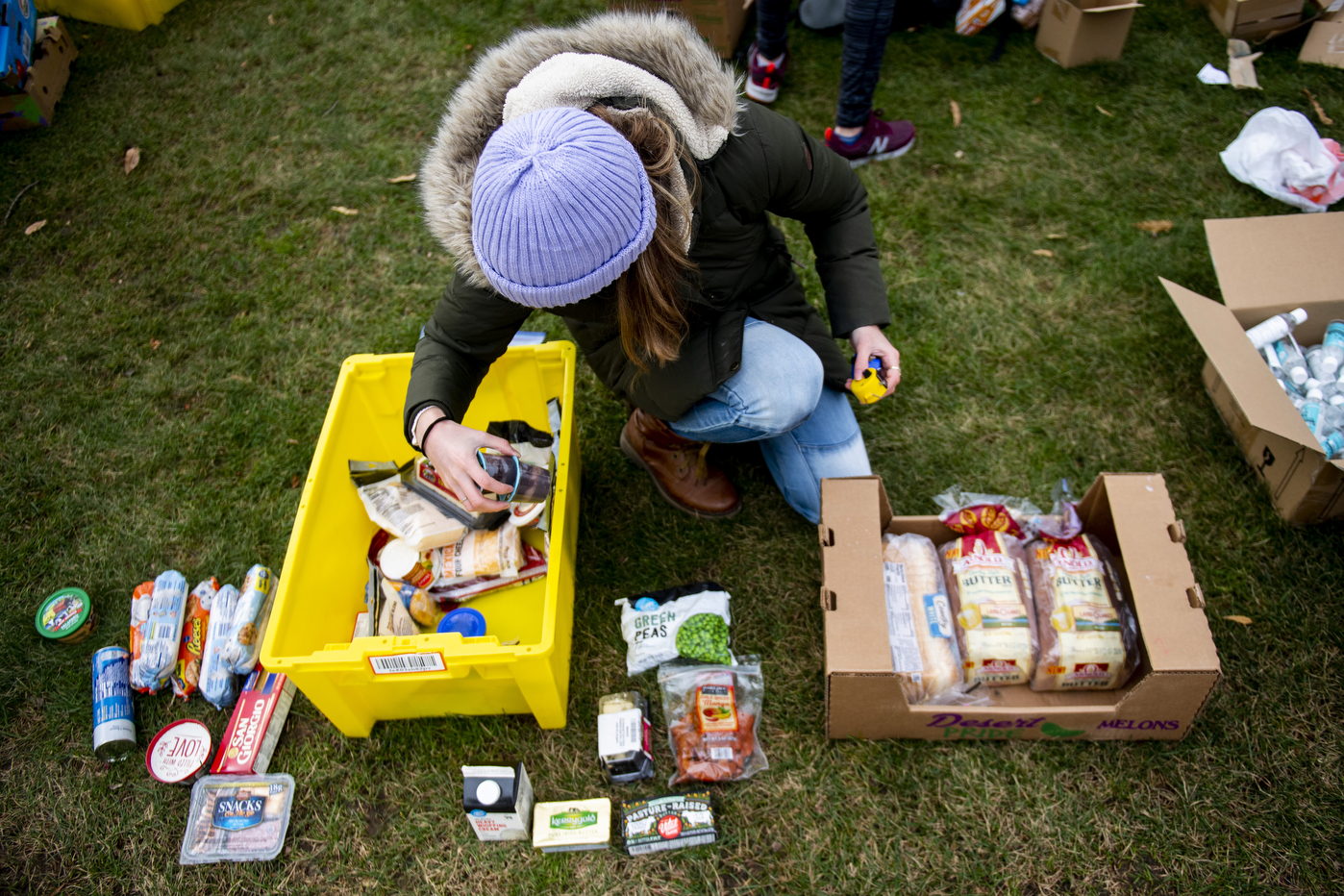 |
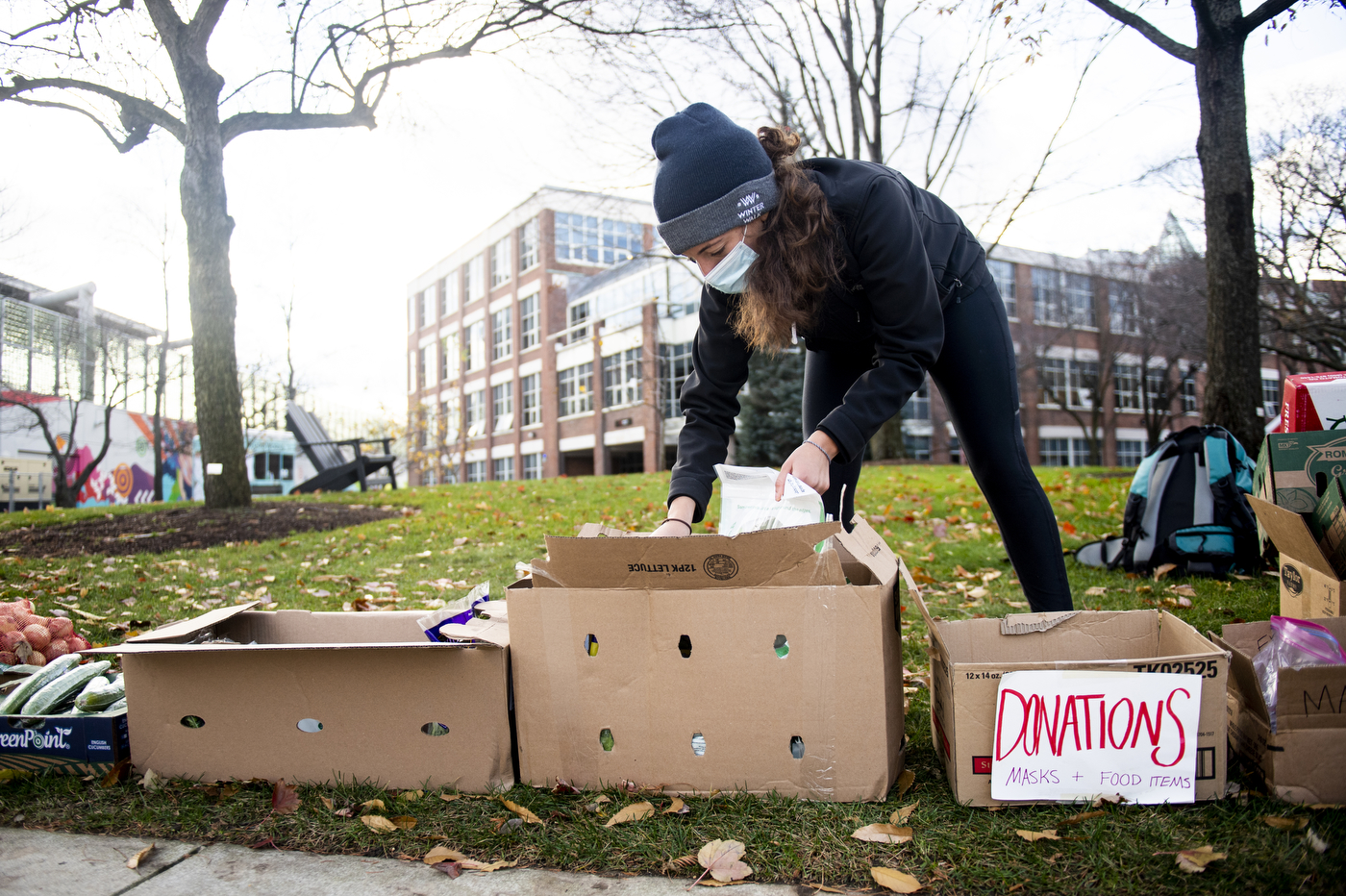 |
NU Mutual Aid holds a mobile food pantry to provide resources for food insecure community members on Centennial Common. Photos by Ruby Wallau/Northeastern University
Di Gangi, who is studying health science, traces the journey of how she got here to a COVID-19 pop-up course offered at Northeastern over the summer. The one-credit online class was designed to help faculty and students engage in community service “to help our world by volunteering their time,” according to a course description.
Di Gangi, Evans, and other students in the Bouve College of Health Sciences got the idea to launch Northeastern Mutual Aid, a student-run network to help their peers during the pandemic. The university has programs to help the hungry, but Di Gangi and Evans forged ahead with their group because, during a period when millions of Americans lost their jobs, “we felt that there were going to be more food-insecure students on campus and also just in the Northeastern community in general,” Di Gangi says.
As she talks, several people pick up shopping bags and begin filling them with free hand sanitizer, masks, and vegetables. “Take what you need,” says a handwritten sign on graph paper, next to another sign that says “Please Sanitize First,” and is affixed to a large pump dispenser of sanitizer.
Minutes later, another group comes by eyeing a yellow plastic bin full of cheddar and mascarpone cheese. No one seems interested in the cups of almond milk pudding, and the bag of chile spiced mango slices from Trader Joe’s are not a hit.
Minutes later, another group comes by eyeing a yellow plastic bin full of cheddar and mascarpone cheese. No one seems interested in the cups of almond milk pudding, and the bag of chile spiced mango slices from Trader Joe’s are not a hit.
Mutual Aid gets most of its food items such as eggs, meat, and cheese from nearby Fair Foods, which collects still-edible food from grocery stores and other venues and distributes it to people in need. The donations to Mutual Aid are free in exchange for the Northeastern students bringing on other volunteers. The student network also springs for school supplies and other items via GoFundMe donations. The group is halfway to its goal of collecting $500.

“When you go to a large institution, you might not think of food insecurity as being an issue because it’s something that still has a big stigma around it,” says Catherine Di Gangi, a fourth-year student who volunteers at Northeastern Mutual Aid’s food pantry on Centennial Common. Photo by Ruby Wallau/Northeastern University
Di Gangi and Evans have been setting up shop on Centennial Common for almost three months, rain or shine. Things haven’t always gone smoothly. Sometimes there are logistical hurdles, like one morning when the car they rely on to pick up donations from Fair Foods had a dead battery. To the rescue came Harrison Garcia, a fellow student volunteer who’s pursuing a double major in biology and business.
“We’re all a really engaged group of kids,” says the Rockland County, N.Y., native. Garcia will be doing a co-op with Fair Foods in the spring.
For him, hunger is personal.
He says some of the friends he made in freshman year couldn’t afford meal plans and struggled to get by on an empty stomach. Then the pandemic hit, and suddenly “you see people on the evening news who just lost their jobs, worrying about buying groceries.”
“The pandemic magnified hunger issues so much,” especially among students, he says.
Anecdotal evidence suggests that nationwide, some college students are going without food, which can negatively impact their academic success. But getting a handle on the extent of the problem isn’t easy, according to a 2018 federal government report written in response to a request by several Senate Democrats, including Elizabeth Warren of Massachusetts and Patty Murray of Washington.
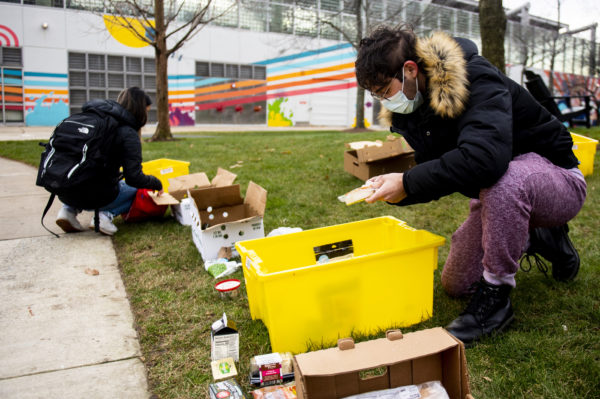 |
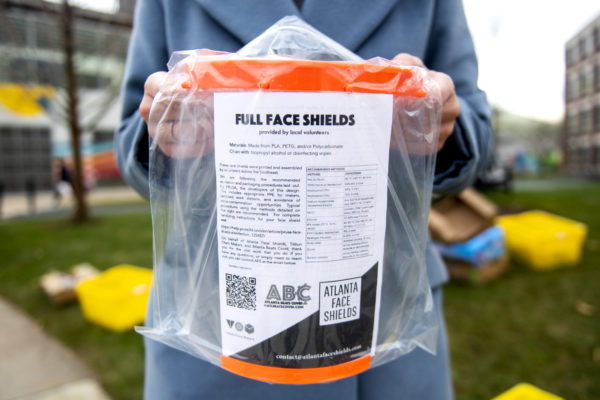 |
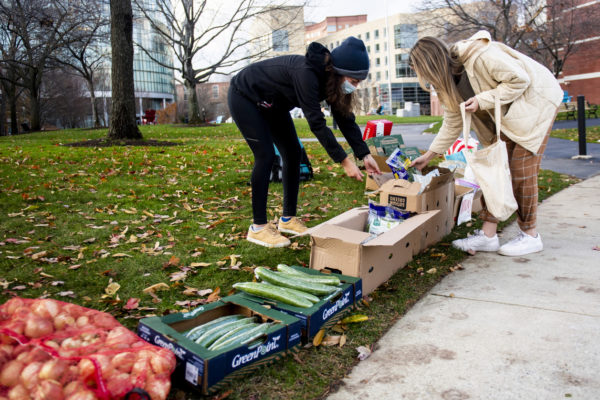 |
Harrison Garcia (l, kneeling in purple pants) is a volunteer with Northeastern Mutual Aid’s food pantry. It provides free food on Centennial Common to anyone who wants it. “We’re all a really engaged group of kids,” he says. Photos by Ruby Wallau/Northeastern University
One reason hunger might be difficult to nail down is the stigma, which prevents people from coming forward for help, says Di Gangi. Hunger, she adds, isn’t something that’s usually brought up in polite company.
“When you go to a large institution, you might not think of food insecurity as being an issue because it’s something that still has a big stigma around it,” she says. “A lot of people are really embarrassed about it and so that’s not something that people talk about.”
But what she sees and hears are telling signs of how deep the problem may be.
As proof, she points to the dwindling supply of food lying on the grass beside her—despite the fact that she and the other volunteers have been stationed there for less than an hour.
“This is actually pretty low,” she says. “We usually have more than this but so many people came and they took a lot of food.”
The demand reminds her of a story.
“I remember there was a student who came here and told us that toward the end of every month there was no grocery money left,” Di Gangi says. The student would visit the Ruggles food pantry the last two weeks of the month because otherwise this person—whom the volunteers want to remain anonymous—“would be eating scraps out of the fridge” and wouldn’t have access to fresh produce.
“Having that option of the pantry is really nice during this pandemic because it is such a stressful time with money,” she adds.
Written by
